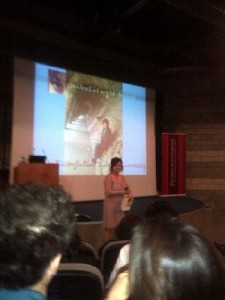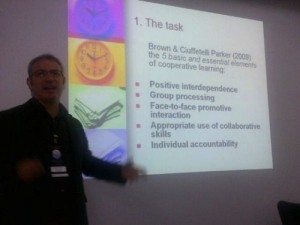Reflections on the Bilgi ELT 2012 Conference
Adam J. Simpsons reports...
The Bilgi University ELT conference took place on May 12th, 2012 and revolved around the theme of ‘Using Resources Efficiently’. Sabancı University’s School of Languages was well represented at the event, featuring a plenary talk, a keynote speech and a concurrent session from members of the SL.
The opening plenary of the conference was delivered by Michael McCarthy (via video) and Geraldine Mark. In ‘Working with learner grammar data: getting our hands on the corpus’ the speakers focused their talk on writing and speaking corpora gathered from L2 learners. Corpora are large and structured sets of texts from a target group, in this particular case, L2 learners. After analysis of the corpora, the speakers determined that as a learner’s lexicon increases, so does the variety of grammar problems. Countable nouns were given as an example of this phenomenon. The main message was to rethink when and where we teach grammar. Even at B2 and C1 levels review of grammar taught at lower levels needs to be revisited. In the second half of the talk they discussed how the corpora revealed an input-output lag in conversation fluency. They focused on the importance of conversation markers that reveal a speaker is following the thread of conversation. Three areas were discussed: 1) Markers: well, right, ok, etc., 2) Response Tokens: great, sure, etc., and 3) Small Words: why not? etc.
The speakers concluded their talk by summarizing the need for Corpora:
1. They enable us to see how language is used
2. They reveal correct usage and persistence of error
3. Benchmarking against exams
4. Higher motivation for students
The speakers rounded off by suggested visiting the website www.englishprofile.org for more information.
 Dr. Deniz Kurtoğlu Eken from the School of Languages delivered the second plenary talk, titled ‘I-sources as my Re-sources.’ The effectiveness of our teaching practices and other professional work surely depends on a wide range of factors, indicated Dr. Eken, the most essential being our own motivation. We know that our well-being matters; that our happiness affects all aspects of our lives; and that our motivation and inner peace is a prerequisite for greater effectiveness in our professional work. We try so hard to do our jobs in the best way possible; we strive to support our students and others in their development; we listen to them; we try and empathize with them; we give them good care and attention. This, we also need to be able to do – and even more importantly – for and with ourselves. In her presentation, Dr. Deniz Kurtoğlu Eken focused on teacher motivation as well as teachers’ views and perceptions of it. She shared some interesting data to create an impression about the issue of motivation in ELT in Turkey, pointing out the necessity for self-motivation and inner peace as a teacher, things which are neglected most of the time. She questioned how much of teachers’ own sources are neglected in these days of technology and the multitude of other resources.
Dr. Deniz Kurtoğlu Eken from the School of Languages delivered the second plenary talk, titled ‘I-sources as my Re-sources.’ The effectiveness of our teaching practices and other professional work surely depends on a wide range of factors, indicated Dr. Eken, the most essential being our own motivation. We know that our well-being matters; that our happiness affects all aspects of our lives; and that our motivation and inner peace is a prerequisite for greater effectiveness in our professional work. We try so hard to do our jobs in the best way possible; we strive to support our students and others in their development; we listen to them; we try and empathize with them; we give them good care and attention. This, we also need to be able to do – and even more importantly – for and with ourselves. In her presentation, Dr. Deniz Kurtoğlu Eken focused on teacher motivation as well as teachers’ views and perceptions of it. She shared some interesting data to create an impression about the issue of motivation in ELT in Turkey, pointing out the necessity for self-motivation and inner peace as a teacher, things which are neglected most of the time. She questioned how much of teachers’ own sources are neglected in these days of technology and the multitude of other resources.
Jim Scrivener delivered the closing plenary talk, which was ‘A Manifesto: for Active Interventionist Teaching.’
• Are we really as effective at teaching as we imagine we are?
• We say that we are “communicative” but, do we, in practice, do “whatever’s in the coursebook”?
• Is our methodology really rather hit and miss?
• Does much contemporary teaching (fluency tasks, communicative focus, fear of being “teacher-centred”) actually sidestep the real teaching work and the real needs of learners?
• And is it possible that the majority of teachers who have been trained in the last twenty or so years have become so used to delegating the teaching work to “good enough” books that they have lost many of the teaching techniques that previous generations took for granted?
These were the questions Scrivener posed in his talk, which proposed a muscular reinvigoration of teaching: focused, active, alert and getting much closer to where the learning is. Scrivener suggested that there is a particular type of teaching skill that has been lost more than others. This is the skill of getting in close to where the learning is going on – for example, looking closely at language and materials, helping learners to zoom in on language items in order to recognise them, understand them, say them better and use them well. He proposed that this kind of exploratory, reflective, quantum-level, analytical, language and learning-focused teaching is essential and its absence in so many classrooms is becoming a serious problem.
Zeynep Ürkün’s keynote speech was titled ‘Resources for ELT Assessment: where are they?’ As teachers of ELT/ESL, we receive training on almost everything: tried and tested teaching methodology, action research, pedagogy, psycholinguistics, discourse analysis, applied linguistics, materials design, you-name-it-we-get-trained-on-it! However, there are still very few opportunities available for those who would like to improve the way they assess their learners, in spite of the fact that assessment is as natural a part of the teaching process as any of the above-mentioned courses we are often required to take. Similarly, in stark contrast to the availability of an “immense variety of teaching resources that could be applicable in our classes”, the resources for ELT testing and assessment can only be described as “scarce”. This leaves very little room for those ELT teachers who would like to specialize in the area of testing and assessment. Ürkün’s session provided several examples of readily-available resources for testing and assessment and showed examples of some online resources, as well.
Professor Birsen Tütüniş’s Keynote Speech was titled ‘Learner Enabling Resources.’ Learner enabling resources, Professor Tütüniş stated, move the learners and teachers from traditional learning and teaching models to a model in which the learner develops their metacognitive learning skills with the help of the teacher as a facilitator, and as a provider of resources that make teaching and learning more efficient. Her paper presented pre-service and in-service training on how to make use of resources effectively to achieve this goal.
Kristina Smith’s Keynote Speech was titled ‘Teaching and training online: discover what it’s like to be an e-moderator.’ Online education using Virtual Learning Environments like Moodle, Blackboard, AdobeConnect, etc. is becoming more and more common, which opens up the possibility of studying courses hosted in other countries without leaving home oneself. Also, the possibility of teaching online, of being an e-moderator, is becoming a more common job. Sometimes faculty members teach face-to-face in one country while teaching students online at an institution in another country. Even if you haven’t tried it yet, Smith suggested, you may find yourself involved in e-learning either as a student or a teacher in years to come. What is it like to be a student online and to be an e-moderator? In this workshop, using guided visualization real examples from professional development courses and mini problem-solving tasks participants were given a chance to discover more about the cognitive and affective sides of e-learning through following a ‘typical’ course cycle. She paid particular attention to the skills and multiple roles of the e-moderator and compare them with face-to-face teaching.
Gordon Lewis’s Keynote Speech was ‘Social Learning and Communities of Practice- in search of a definition.’ In today’s world of education, noted Lewis, the terms social learning and communities of practice are often used interchangeably. But are the two concepts really the same? While both share common principles and tools, the goals and structure of each are different- with social learning focusing more on the individual and communities of practice, as the name suggests, more concerned with shared knowledge tied to a common goal. In this talk Lewis sought to define both concepts clearly, providing examples of each. He then considered what kind of community we might consider building in our context and how we can assess its success or failure.
Eric Baber’s Keynote workshop was titled ‘The mobile phone: a teacher’s friend or a teacher’s enemy?’ When we were kids, Baber noted, we used to pass messages to each other under the desk on slips of paper. Learners nowadays still pass messages to each other under the desk, but the means of communication have changed from slips of paper to SMS messages, IM and e-mail, all done via their mobile phones. So are mobile phones the enemy of the teacher? In this session he argued that this isn’t the case. Instead of forbidding students from using their mobile phones in the classroom, Baber suggested we should encourage them to use their devices for meaningful activities. In this talk he demonstrated some mobile apps and mobile-optimized online content which was either specifically designed for learners of English or which can be exploited for learning and teaching. He also looked at activities a teacher can set students both in the classroom and as homework to ensure students use their mobile phones for more than just arranging their next night out and “whispering” behind the teacher’s back!
 Sabancı University’s School of Languages was also represented among the numerous concurrent sessions on offer. Adam Simpson’s paper presentation was titled ‘Group Work: A New Factor to Consider?’ When we do group work in class, Adam noted, it isn’t always successful. Is this due to the task, the students, or is it perhaps connected to ineffective group formation? Simpson’s presentation examined the literature behind group formation and group tasks and compared this with the findings of classroom-based action research.
Sabancı University’s School of Languages was also represented among the numerous concurrent sessions on offer. Adam Simpson’s paper presentation was titled ‘Group Work: A New Factor to Consider?’ When we do group work in class, Adam noted, it isn’t always successful. Is this due to the task, the students, or is it perhaps connected to ineffective group formation? Simpson’s presentation examined the literature behind group formation and group tasks and compared this with the findings of classroom-based action research.
